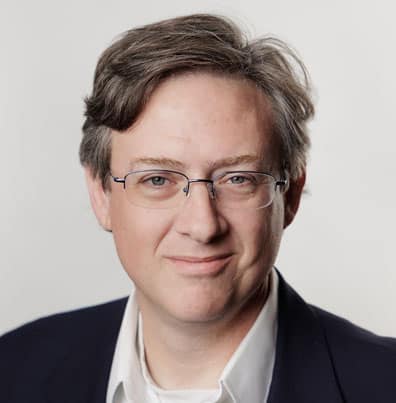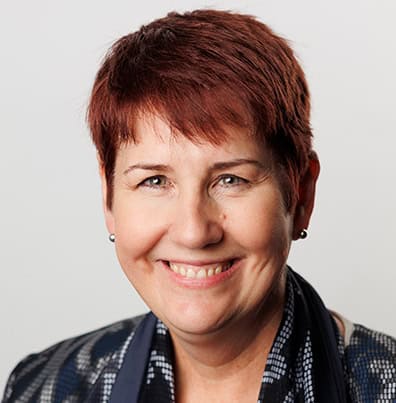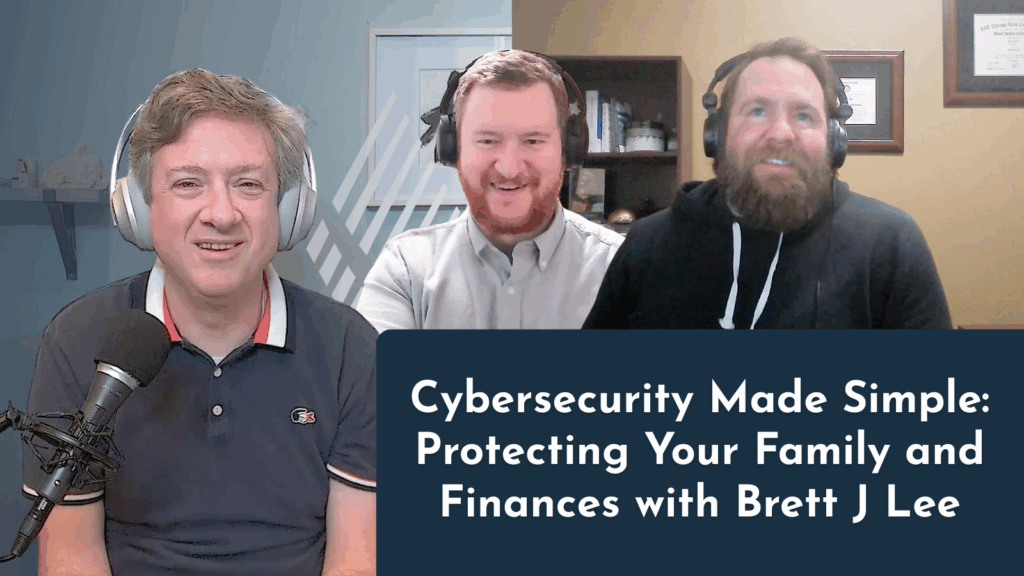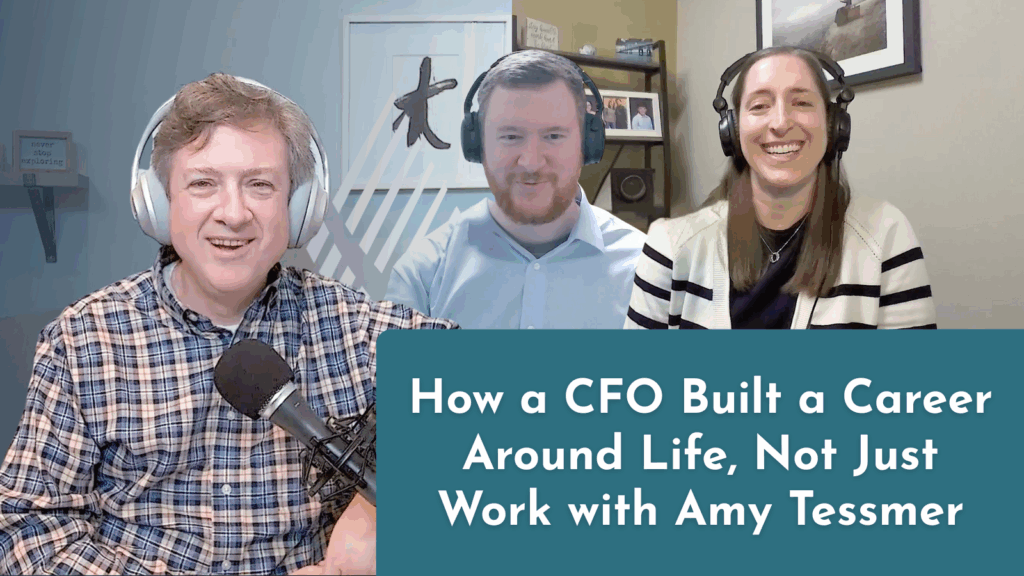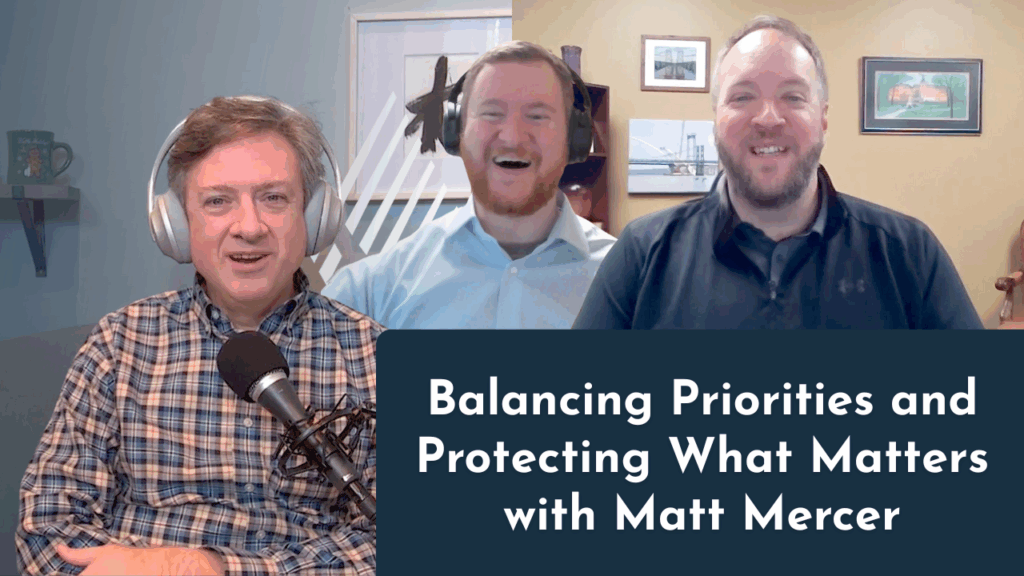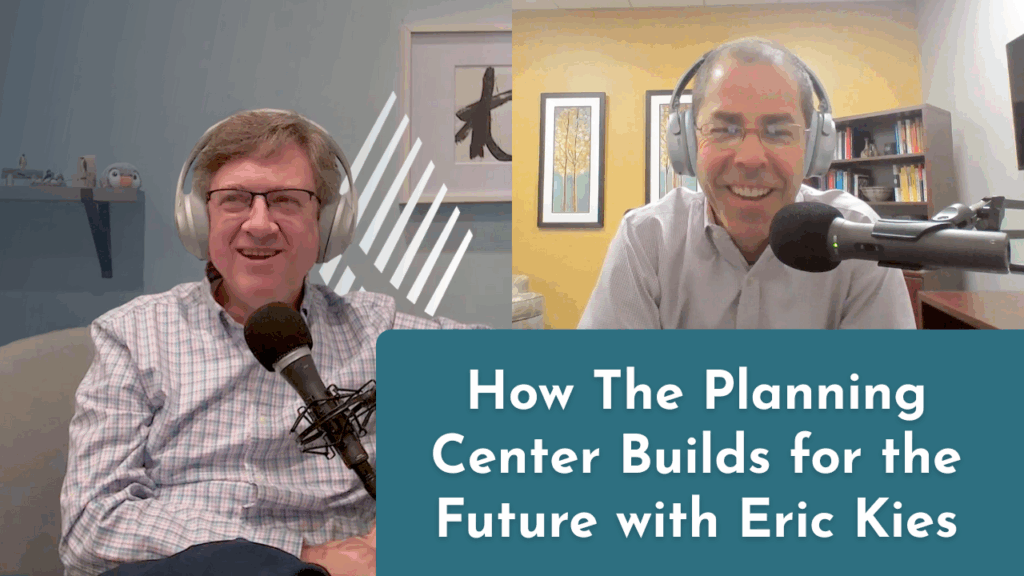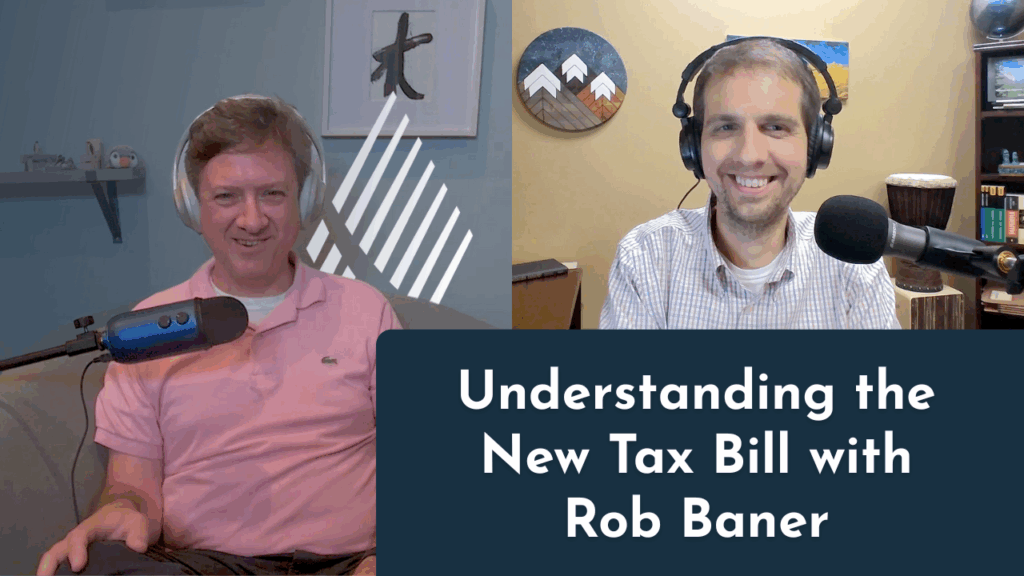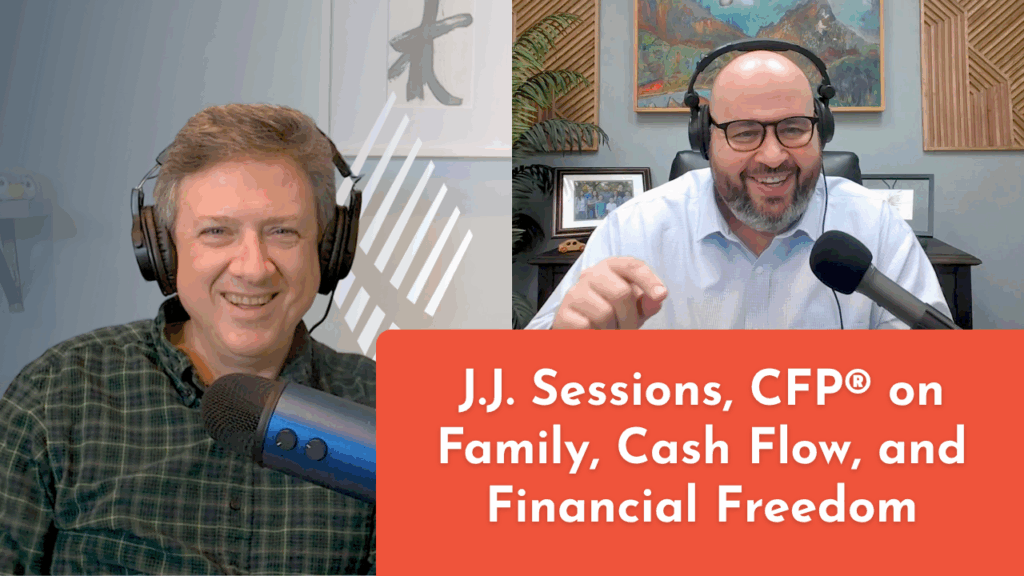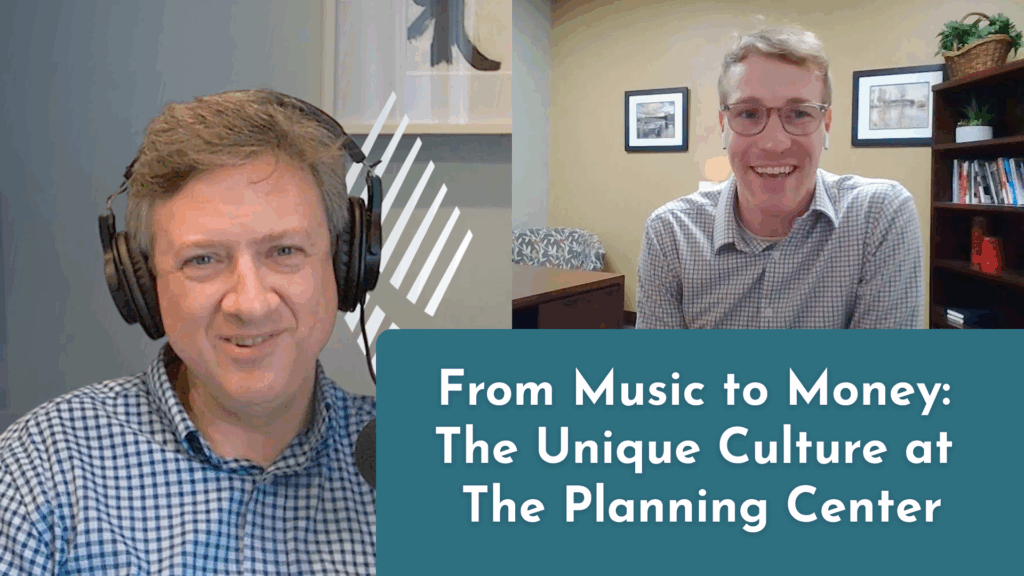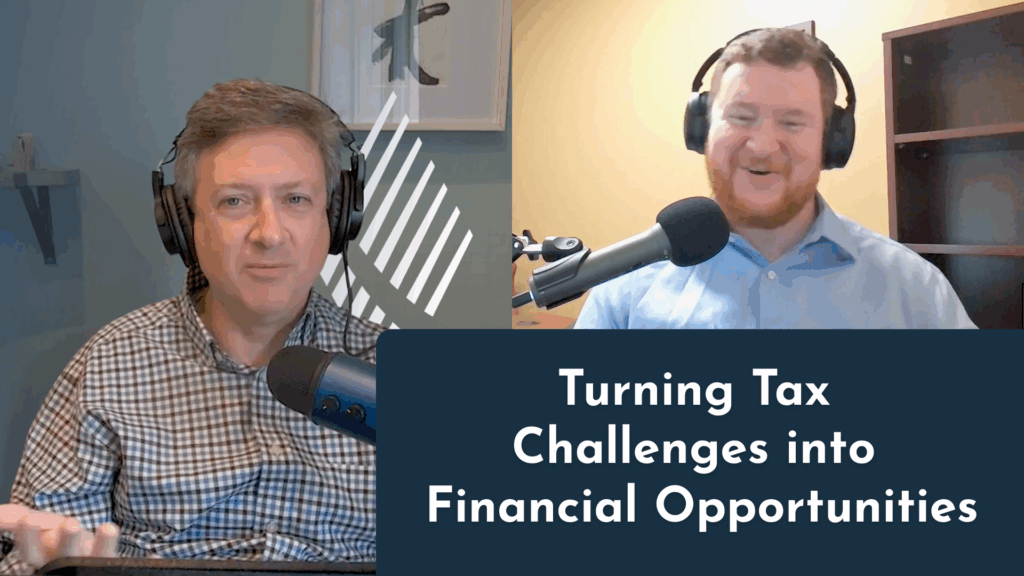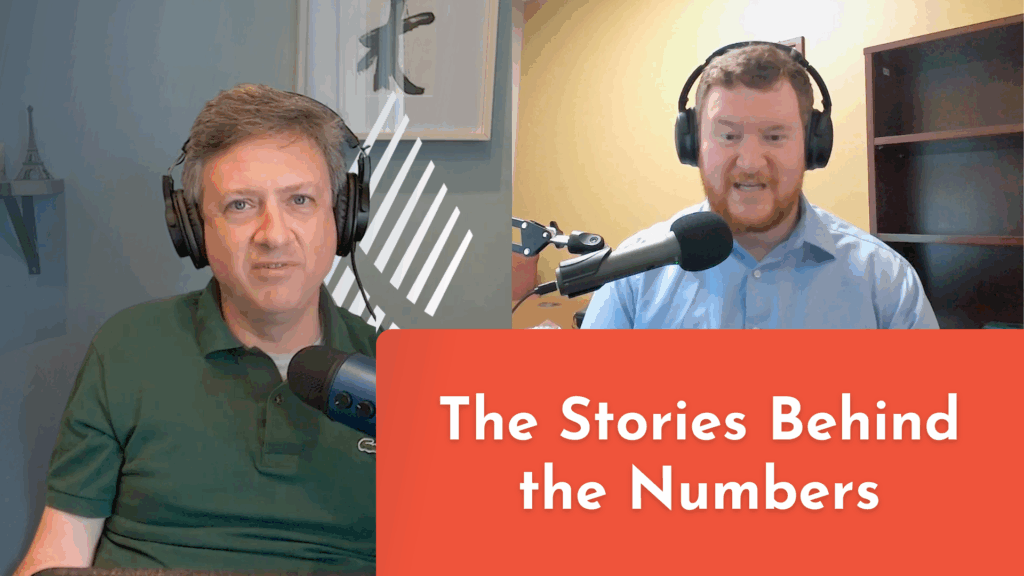[00:00:00] Intro: Every number on a balance sheet tells a story, late nights spent building something meaningful, the risks taken, the difficult conversations. The lessons learned along the way, but true wealth is not measured in dollars. It’s woven into the stories that we create, the experiences that shape us, and the memories that outlive us.
Welcome to The Living Beyond The Numbers Podcast with Jude Boudreaux from the Planning Center. This show is not about spreadsheets and financial jargon. It’s about real conversations and powerful stories. That help you align your money with your values, your dreams, and your legacy, because at the end of the day, it’s not about how much you have, it’s about the life you want to live and the stories you leave behind Now onto the show.
[00:00:51] Jude Boudreaux: Hello. Thanks for joining us again for another episode of Living Beyond the Numbers for the Planning Center. I am, uh, your host, Jude Boudreaux. I’m here with [00:01:00] Caleb Airdale, our director of Positivity. Hello. And today we’ve got, uh, our special guest is Michelle Matan, who’s, uh, one of our shareholders and partners in our Chicago office.
So welcome, Michelle. We’re really excited to have you here today.
[00:01:13] Michelle Maton: Yeah, it’s exciting to be here.
[00:01:15] Jude Boudreaux: Yeah, thanks. So, um, we often like to start with just kind of like how people got to the planning center when they’re part of, uh, our firm. So yeah, maybe share a little bit about kinda that origin story and how it came to be that you’re, that we work together now.
[00:01:30] Michelle Maton: Well, I. Was living in California, graduated from college and my mother had started a financial planning firm in Chicago and I decided that it would be easier to work with her than it would be to work for a big bank or whoever I was working for at the moment. Actually, I was working in a pension consulting firm.
So it was like adjacent to financial planning, but um, it just sounded a lot more fun. So I moved back from California to work with her and [00:02:00] we built a business together, small business. We had a couple of employees and as we both got kind of a little closer to retirement age, I decided it would be a good idea to think about what the future might hold for me.
Um, and that’s when I brought, I started talking to, uh, other members of the planning center. Uh, I had met Marty years ago, Marty Kurtz, and just sounded like we had a lot in common and kind of approached client service the same way, which is a hard thing to do in our business. Um, and. We made the big step to join the planning center.
So that was in 2016. So it’s been a number of years. It’s been great. It’s been great not to have to be the chief, uh, cook and bottle washer and do a whole bunch of things besides planning. ’cause now I can just do planning
[00:02:57] Jude Boudreaux: as somebody who had my own practice and [00:03:00] then merged in as well. Uh, I. Tell other planners, like, yeah, like, yeah, of course you don’t get to make all of the decisions anymore, but it’s really nice to, somebody asked me what my rent was in New Orleans and I, I don’t know, like I, I know I knew it when we went through the negotiations, but like Amy and Laa are on top of that.
So like I get so much more focused on just what I do and the things that I can be good at and, um, yeah. And I think that, you know, is probably very much the same for you.
[00:03:27] Michelle Maton: Yeah, very much the same.
[00:03:28] Jude Boudreaux: So, um, you know, I assume a lot of people who listening will be clients and they’ll remember, you know, your mom, Sicily.
So, uh, tell me a little bit about, you know, not everybody I think would choose to go and work with their mother perhaps, so, but you made that leap. So what was that like? How did, how did that go for the two of you? What was it like working together?
[00:03:46] Michelle Maton: For the most part, it was really great, you know, every once in a while we would be like, our, our husbands would get tired of like.
Business talk at dinner. And so we had to have a few rules about that. Um, [00:04:00] but you know, other than that, most of the time we kind of saw eye to eye and we were close enough in how we worked and thought, but slightly different enough that it worked out pretty well. I really enjoyed it.
[00:04:14] Caleb Arringdale: So how did your mom go about building a business in Chicago in a time when this was, I mean, a absolutely male dominated industry.
[00:04:23] Michelle Maton: She focused on a niche, and that was women going through divorce. And she found an attorney or some, some attorneys who would work with her providing the financial support, um, for, for women going through divorce. And she did seminars. She did seminars all across the Chicago land area, usually with.
One of these attorneys.
Um, and we charged like $49 and we didn’t make money on the seminars, but out of those seminars came clients. Um, and we built, built on that. And then out of [00:05:00] those first, like women clients, we got like their sons, um, or other people who knew them. So, you know, just over time you build, you know. You build on your existing client base.
So that was kind of our initial group of people that we had
[00:05:18] Jude Boudreaux: and something that I think is, you know, pretty special. And if you caught the episode before, we talked with Eric Keys, our CEO, about, you know, helping those founders retire, is that, you know, it’s now part of my responsibility. Certainly a lot of yours, Michelle, to.
Serve some of those, you know, those first clients as first women or so who came on. And it’s amazing to see like in the 30 year history in the portfolio and all of this, all the background and all the life that we’ve gotten to go through with them. And that your mom can retire and step away and, uh, that, you know, we’re still here taking care of the people that are important to her.
[00:05:54] Michelle Maton: Right. That was, that was really important to her while we were. In negotiations with the planning [00:06:00] center was just, are my clients gonna be well cared for? Yeah. Oh. So I think, I think they have been,
[00:06:08] Jude Boudreaux: yeah. And I don’t know that anything would’ve mattered more to Sicily as somebody who got to work with her for quite a while.
And, um, so, so that’s great. But she is, seems to be just as active as ever. So maybe give us the, the brief update, ’cause I’m sure some of those clients are listening in too.
[00:06:25] Michelle Maton: She’s been traveling a lot, uh, probably three or four big trips a year. So she’s really, yeah. She sometimes travels with us and sometimes without us and travels on her own, so she puts these trips together.
It’s, it’s great. So yeah, she’s been having a good time.
[00:06:46] Caleb Arringdale: I remember talking to her at one of her last meetings at the planning center and I asked her like, what would, what she was going to do next? She said, well, my next plan is to go to Korea and spend a month following some K-pop group, and she was close to 80th the time.
I was [00:07:00] like, wow, Cecily is amazing. Just, just an amazing person.
[00:07:04] Michelle Maton: Yeah. She been to Korea twice since she retired, so
[00:07:08] Jude Boudreaux: yeah. Whenever clients ask, I always say like, she’s the person you knew, like she’s.
Doing the same things and wearing your hats and Yep. You know, out outliving and doing all of the things. So, um, so it’s great.
It was such a great example for many of us to, to be able to see and follow. So, um, yeah, so I mean, I guess if, you know, that kind of started with these women who were, you know, going through divorce and in this kind of transition part, I think that leads into, you know, I feel like.
What I think of as one of your specialties, which is kind of working with women in transition.
I know you have some advanced training in that too, so mm-hmm. Maybe tell us a little bit about like that financial transition program and you know, what that means for you.
[00:07:50] Michelle Maton: Well, for, for Sicily and I. It, you know, it was kind of became clear that, I mean, divorce is one of many transitions and there’s lots of others that happen in [00:08:00] people’s lives.
Some may be happier than divorce, um, and some not. And, you know, that’s the time when people really need planning. You know, they don’t, they aren’t as worried about, uh, I don’t know, investments or these other things. They really need.
To figure out what they want out of life and how to get it and where to go next.
Um, and they have this opportunity because, um, transition’s an opportunity to, to change a life and make your life better, hopefully. Um, and ha come up with a new normal as, uh, we say in FTI.
Uh, so we’ve been a member of that group for a long time and it, it is different. Especially the bigger the change, the more, uh, the more you need some extra training and extra tools.
I mean, working with [00:09:00] a widow who’s lost her husband suddenly is not the same as working with a couple who are coming in, wondering if their retirement’s gonna be okay.
Um, so it, it, it is helpful to have, uh, like-minded people to bounce things off of and be part of that group, um, and have tools that are created specifically for those situations so that you can.
Pull ’em out, um, and kind of have a script and know what to do. So it’s been really helpful to have, have some of that.
[00:09:30] Jude Boudreaux: I think as advisors, all of us know that. Yeah. When these things happen, obviously it’s a big thing and I think there’s so few that go forward and say, well, we’re gonna do some special program that’s really focused on this time.
Um, and it’s.
The language and things from the Financial Transition Institute I find so helpful. When, um, last year I had a couple of, you know, people whose partners died after long, you know, long lives and long marriages and, um, be able to sit in that space and talk to [00:10:00] them and ask certain questions is, um, I think just one of the more, most important things we get to do for the clients we get to work with.
[00:10:08] Michelle Maton: I agree.
[00:10:10] Jude Boudreaux: I guess, tell us a little bit more about some of those transitions and you mentioned the, the opportunity part, and I think that’s, um, you know, maybe it’s hard to see, uh, sometimes at the beginning, but is obviously a really important part of this, so maybe share a little more on that.
[00:10:26] Michelle Maton: Sure. Well, that’s what we call the passage, and it’s a messy time right there.
It’s chaotic. It can be very chaotic for people. It could feel that way to people. So we try to bring some.
Bring some stability to that, that, that time by just saying, okay, you don’t have to accomplish everything.
Um, you don’t have to do everything. Let’s just do one thing at a time. Let’s do the most important things first.
Let’s leave these other decisions until later when you feel more able to handle them. If we’re talking about a widow, [00:11:00] for instance, um, or I have a client right now who’s increased their net worth by a lot. And so they have this opportunity to kind of go back and, you know, he asked me, he asked me, well, what do we do with this money?
And I’m like, well, that’s not really the right question yet. We have to figure out what you wanna do. We have to kind of start all over again. So they’ve been clients for a while. We did a plan, but now this means, this means they have a lot more resources to do more things. That they didn’t think were possible before.
So what does that mean? So truly they have to go back and kind of reinvent themselves and, um, you know, what’s what, what are the things that they, they want to keep? What do they want that’s really important about their lives that they wanna keep now?
[00:11:53] Jude Boudreaux: Mm-hmm.
[00:11:54] Michelle Maton: What will be in the future? What things can they build that they really want?[00:12:00]
So it’s really important to have all that before you go and invest the money or do whatever. You know, we, we really have to, we have to really go back and kind of start all over is what I told him.
[00:12:16] Caleb Arringdale: And you mentioned the passage there, but what, what is the full transition process look like? What would you say the steps of that are?
[00:12:24] Michelle Maton: Well, for some transitions, there’s anticipation. Right. So you, you’re, you think you might ha get an inheritance or it’s a long illness and you know your partner’s going to be passing away. So there’s some anticipation there. And then there’s the ending when the event actually happens. So the person dies.
The, the, uh, divorce is final.
Uh.
The money. You get the money, uh, you sell your business and the money’s in the bank. All of that’s the ending. You know, [00:13:00] once, once you’re an ending, then you’re in passage, right? That’s the next step. And that can be, it can be, it ranges in time period. I know everyone in this culture kind of wants to get the answer tomorrow.
Um, but these things take time.
Um, I mean, if you think about a widow, it’s gonna take a while. And for some widows, you know, I’ve been doing this work for a long time and I have some widows that I don’t think they’ll ever really recover. I, I’m not sure that they’ll ever really be, you know, like some amazing blossoming.
Um, but, but their grief is gonna go on forever and it’s gonna be so debilitating that it’s gonna be hard for them.
Um, but passage.
Goes on for however long it needs to go on. And then at the end of passage there’s a new normal. And I think for a lot of people, um, I think they wake up one day and [00:14:00] they’re like, ah, you know, I’m in the new, I’m in the new place.
I’m the new me.
[00:14:07] Jude Boudreaux: Yeah. I think clients like, you know, we all want certainty that really isn’t offered to us in this world.
Mm-hmm. But you know, they wanna know like, oh, well when is this going to happen? You know, I don’t know, like you want me to wager a guess longer than you think, 18 months or, you know, like it’s gonna be a while.
Um, but it, you know, holding onto the space of possibility, I think within that is, um, you know, becomes its own gift because ultimately clients will get there and see that. But, um, you know, I think maybe share a little bit more about the. I think it’s important when we talk about slowing down kind of the process in that transition space, in this passage, maybe you can say a little more about, you know, how that works with a, a family or a person who’s in transition.
[00:14:54] Michelle Maton: Well, in, in our speak, it’s called the decision free zone. So [00:15:00] you agree with the client that.
There’s certain decisions that aren’t gonna be made at at this point, really. So you do some triage, like what things have to be done, um, and what things can be left and you leave, what can be left so that the person has time to process, you know, what’s happening to them and what, what’s going on with them.
Um, and only like take care of what really has to be done, um, and just agree. These other decisions aren’t gonna be made, and we’re gonna wait until some period in the future, um, together before we make those decisions. So it’s really, it’s really setting up that agreement with the client that it’s okay to leave the money in a money market.
It’s okay to not decide whether you’re gonna sell your house or not. It’s okay to do any of those kinds of things. It’s just okay. It’s just to be where you are today.
Um, and [00:16:00] depending on, you know, what transition we’re talking about, um, sometimes it’s hard to get up the next morning, right. For some, for some widows and widowers.
[00:16:11] Jude Boudreaux: Yeah.
Uh, it’s, um, yeah, sometimes it is. And, um, and yet I think there’s so much value in just saying, you know, I know you’ve been thinking about like, you might wanna sell the house. I gotta tell you, if, you know, this is a difficult and expensive decision to unwind, if you rush into something and it’s really not, um, you know, you’re running away from something more than towards, uh, something.
So taking that space and knowing that financially it’s gonna be okay, like everything else is in order and we’ll take care of what’s important.
Um, I think providing that, that spaciousness is a, is a tremendous gift in, in a difficult time.
[00:16:49] Michelle Maton: Mm-hmm. And people are ready for, you know, for things as as we go on, right?
Yeah. I’d say for a lot of [00:17:00] widows, like at least a year or a year and a half before they’re ready for, and sometimes longer, and you have to let ’em, let ’em know it’s okay because everyone else is telling them that they should be over this. Right. So everyone else in their life is saying, oh, it’s been a year.
You should be doing great. You know, and that’s not true.
Um, some people it takes much, much longer.
Um, or, or there’s things that pop up, you know, like anniversaries, like the anniversary, birthdays, like the anniversary of the death. All these things are like important to remember and think about as much as we can.
[00:17:42] Jude Boudreaux: Sure. It almost feels like you have to cycle through that year of things before. I think, I don’t know. It just seems to me like you need to get through that birthday, the holidays, the, you know, the special other, all the special times you would normally be with your partner. As remember that they’re not there for the [00:18:00] first time in all of those before there becomes even a, a window that, um, you know, things might be different, but it’s, uh, yep.
Yeah. Everybody’s got their own pace with these, with these things, for sure. Mm-hmm. And so we’re talking about these difficult transitions, but maybe share a little more about, you know, the, you know, opportunities or the things that you’ve seen come through this that’s, um, you know, open a, a whole new door to.
Sue of blossoming, as you mentioned.
[00:18:29] Michelle Maton: Well, let’s take retirement, which is something that, uh, you know, most people look forward to, um, but not everybody plans for. So I think, I think as you said earlier, uh, planning for a going to is really a really important for people, um, to build something.
Uh, and so we spend.
We spend a fair amount of time with retiring clients on, you know, what is retirement gonna look like for them? Uh, does it mean [00:19:00] we’re volunteering? Does it mean, uh, spending more time with family, traveling from family to family, going on trips with family, um, building a new business, uh, you know, it can do all kinds of different things that people do.
Um, but it’s.
It’s having, and it may change. I know my mom, for instance, had this list of things she was gonna do, and one of them was play the guitar, learn to play the guitar. She bought a guitar, but that’s all she’s done. So sometimes there’s things on the list that maybe end up not really being that important, I have to say.
Uh, but at least she had, she had all these ideas about what she wanted to do. And not all of them pan out, but you, you at least have this time of trying things out.
[00:19:53] Jude Boudreaux: Yeah. And there’s an excitement that can go with that, along with, you know, I think it’s always awkward to be a beginner, but if we can [00:20:00] embrace that, uh, it opens up its own new language for things and it’s new, um, yeah.
New way of being with the world. Mm-hmm.
[00:20:09] Caleb Arringdale: Could you talk a bit about that transition of retirement? Right. Because like, I know I worked with several clients who. We have a plan. Everything seems great. But when that actually comes to retire, even though the plan is perfect and they have these goals and ideas, the fact of leaving their job is suddenly hits them so hard.
They’re like, they start pushing it off by six months. Six months, six months. How does that transition work for people, or how have you seen that in your experience?
[00:20:37] Michelle Maton: It’s happened to my clients too, but I think we have to dig down a little bit about why. So for some people there’s a financial scarcity thing going on, right?
They’re, they’re just afraid they don’t have enough.
Um, and it’s gonna be different. And sometimes it’s, it’s a matter of structuring, like a replacement paycheck, [00:21:00] you know? So if we can structure a monthly payment that looks like a paycheck, so they feel like they’re in control of their finances just like they were before, right?
It, um.
That helps a lot of people become more comfortable. But I would say that cashflow gets crazy right after retirement. People just, you know, whatever their, whatever they did before suddenly isn’t working anymore.
Um, and they have to kind of get used to a new normal. And I think it takes people at least a year, maybe two, for that cashflow to kinda normalize.
I would say, I mean, I think people put off a lot of like repairs in their house, which they don’t have time to do when they’re working full-time and then suddenly they have time for these projects. So there’s a little bit of money that goes usually to the house and maybe there’s a trip or two that they’ve been putting off for decades that they do in retirement, like right after retirement.
[00:22:00] So it’s those couple of first couple of years and you just have to give people a little space to go. It’s okay, you know? It’s okay if you spent a little more than maybe we had planned. It’s as long as it doesn’t go on again, then I think then I think it, it works out fine. Um, so I think if for those clients who are having trouble, I would find out why they’re having trouble leaving.
So what’s lying underneath that? Is it this insecurity about where’s the money gonna come from to pay my bills next month? Or is it a real panic about what am I really gonna do? So sometimes you could have people maybe, I mean, I love mini experiments, so if they’re thinking about living somewhere else, have they gone and spent a couple more than a couple weeks there?
I mean, maybe that’s the first thing they do is they plan a month somewhere else.
Uh, or, or something like that. So I [00:23:00] think, I think there’s, I think there’s tools we can use to kind of dig down just a little bit to find out why, you know, what’s going on. And sometimes it might be a really good reason.
Um, and they kind of just need to brainstorm more about what they’re really gonna do.
Right. Harder for, and I think it’s harder for men than women by the way.
[00:23:24] Caleb Arringdale: I was just gonna ask that, have you noticed a difference in, in men and women?
[00:23:28] Michelle Maton: Yeah. In my experience it’s, uh, a little, little more difficult for most men. Hmm. Because their, I, their identity is a little more part of, like, their profession is part of their identity.
Uh, for women it’s usually they have a bigger social network. They have other things that they’re involved with, even single women.
Um, their transition is really not usually as difficult for them. They’re like looking forward to it.
[00:23:56] Jude Boudreaux: Yeah. Well, and I, I do think you’re right though. There’s, um, [00:24:00] I had this conversation with the clients who, uh, basically had been the stay-at-home parents for a number of years, but then it’s like, how would he feel if I just showed up at his office every day for the next month?
Like, and ’cause now that he was retired, he was. In her office every day and kind of in her way. So they had to figure out like, all right, well where, what are you gonna do? Like, do you need a shed? Like you had a hobby, something you’ve always wanted to do. And uh, you know, ’cause like, yeah, we have a lot of, and more time together, but sometimes it’s a lot of togetherness, uh, pretty quickly after you’ve been going to the office for 40 years.
So yeah, we gotta figure it out.
[00:24:37] Michelle Maton: When I was a little kid, there was a, a neighbor couple. He had retired and she went back to work.
Um, and she told him, I married you for better or worse, but not for lunch. So I always remember that one.
[00:24:56] Jude Boudreaux: Yeah, that’s perfect. And yeah, it’s true. [00:25:00] It’s a lot of togetherness if it’s all the time.
[00:25:03] Michelle Maton: Yeah, it is.
[00:25:04] Jude Boudreaux: All right. Well, um, we’re coming towards the end of our time. We have some kind of rapid fire questions we like to go through with all of our guests. So, uh, first is, uh, what is your favorite animal?
[00:25:15] Michelle Maton: Oh, my favorite animal is an African wild dog or painted wolf. Also known as.
[00:25:21] Jude Boudreaux: Yeah. And you’ve, um, I mean, say more about that, because I know there’s more to that story.
[00:25:26] Michelle Maton: Yeah, we’ve supported a conservation, uh, project in Zimbabwe for probably 20 years, so it’s been, it’s been, uh, really rewarding to see how much they’ve grown since we first started volunteering with them and, and sending them money. And
[00:25:46] Jude Boudreaux: you have two bji, which are somewhat related.
[00:25:49] Michelle Maton: No, the, the, the African wild dogs are a completely different genus.
Oh, I see. So they’re not really, they’re not canus like our dogs and wolves and most of the wild dogs that you think [00:26:00] about.
[00:26:00] Jude Boudreaux: I see.
[00:26:01] Michelle Maton: I have great fondness for all wild dogs, which mine occasionally are act that way.
[00:26:08] Jude Boudreaux: I can imagine. Um, how about the, um, what do you think is the best money that you’ve ever spent?
[00:26:15] Michelle Maton: I don’t know, I guess our first trip to Africa.
Which was in 1996. So it was kind of a, maybe a big stretch for our budgets at the time that it was worth it.
[00:26:28] Jude Boudreaux: Yeah. Is that how you became, uh, more connected with the project in Zimbabwe?
[00:26:32] Michelle Maton: Mm-hmm. Yep. The, we, we saw signs for, if you took pictures of dogs, you were supposed to send them into this group.
[00:26:40] Jude Boudreaux: Nice. Well, I know that, uh, your husband’s a naturalist and photographer, so, um, know that probably caught his attention right away. Yeah. Yeah. So if you were gonna go buy some happiness, what would you buy and how much would it cost?
[00:26:56] Michelle Maton: I, I’m just gonna go and say you can’t really buy it.
[00:26:59] Jude Boudreaux: [00:27:00] Alright, great.
[00:27:00] Michelle Maton: I’ll just say it right there.
[00:27:02] Jude Boudreaux: So what would you do then? Let’s, we’ll pivot the question a little.
[00:27:06] Michelle Maton: I think getting out in nature some, sometimes it’s expensive, sometimes it’s cheap.
Um, but you can always, usually find some happiness and connection there.
[00:27:16] Jude Boudreaux: Yeah. I often forget that when I think about, you know, we do these big trips in the summer and it’s wonderful to be in the mountains, but if I go here in New Orleans to the park by the river, it’s 90% of that.
You know, it’s still, it’s almost all of it. It’s not quite the same, but it’s, you get a lot of the same, same things out of it. Yeah.
Um, how about the last achievement that you celebrated and how’d you celebrate that?
[00:27:38] Michelle Maton: I haven’t really done anything recently. I can’t say.
[00:27:41] Jude Boudreaux: Okay. Feel like we like, uh, need like a, maybe a continued edge course on like celebrating your achievements.
’cause this is always the hardest one for the planning center people to, to answer.
[00:27:50] Michelle Maton: Yes. None of us like to, as, as Ed Jacobson, for those of you who knew him, he used to say none of you like to cavell about yourself.
[00:27:58] Jude Boudreaux: Right. Well, and Ed came up [00:28:00] on the last podcast too, so, um.
Uh, it’s, you know, it’s interesting.
He’s been part of a lot of our stories, so we’ll need to find a way to Yeah. Capture that too.
[00:28:10] Michelle Maton: It’d be great to do a podcast about Ed. Yeah. And all he taught us.
[00:28:15] Jude Boudreaux: Yeah, I was just thinking that. I mean, I, uh, we’ve got a new team member here and I have a section of books on bookshelf. It’s books that changed my life and one of them was, um, Ed’s Appreciative Moments and Change Your Questions, change Your Life about Appreciative Inquiry that he led me to.
So I think many of us have a.
Things we would share about, about Ed. So that mm-hmm. You put that one on the list?
[00:28:35] Intro: Yeah.
[00:28:36] Jude Boudreaux: Yeah. Um, all right. Travel. Favorite place to visit?
[00:28:40] Michelle Maton: I have to go back to Zimbabwe where I’m going next month, so it’ll be good.
[00:28:45] Jude Boudreaux: Yeah. I kind of thought that might be, um, but then, all right. So how about a favorite or dream trip you haven’t done or place that you’ve wanted to go but haven’t gotten there yet?
[00:28:54] Michelle Maton: Well, we’ve been thinking on and off about going to India, so
[00:28:59] Jude Boudreaux: Seems like a great [00:29:00] adventure.
[00:29:00] Michelle Maton: Yeah.
[00:29:01] Jude Boudreaux: Yeah. All right. Um, best advice that anybody ever gave you.
[00:29:06] Michelle Maton: I guess I’ll go back to some of my mom’s advice, which is pretending you have more confidence until you have the confidence.
[00:29:15] Caleb Arringdale: Fake it. Till you make it.
[00:29:16] Michelle Maton: Fake it till you make it. I wasn’t gonna say that one, but that’s what I was thinking of. Yeah.
[00:29:22] Jude Boudreaux: I think it’s a central part of a lot of our training and even I think many of us who have lots of ability.
Um, don’t always see how much is there. So it’s, um, you know, it’s great to be around this group of people because we are so supportive and we’ll build each other up.
So help you remember that when it’s, when you might be struggling, that there’s a lot, a lot there to offer. So, um, wonderful. Well, Michelle, uh, it’s been really fun having you on the podcast. Any final thoughts that you’d like to share?
[00:29:51] Michelle Maton: Just remember, if you’re in the middle of a transition that we can help you.
[00:29:57] Jude Boudreaux: We’ve all got some background in that, but, um, you know, [00:30:00] you’re one of the best ones. And again, I’ve been fortunate to sit in a bunch of meetings with you and your mom that, um, learn so much from being in those conversations and seeing how you all handled those that I think it’s just such a gift to the families that you all get to work with.
So, um, so anyways, thanks for being here and being part of the conversation.
Um, one of our partners here, so, um.
So, uh, that’ll conclude today’s episode of Living Beyond the Numbers. Thanks for tuning in. Please like and subscribe and, um, send us a message and we’ll see you in next episode.
[00:30:34] Outro: Thanks for tuning in to the Living Beyond the Numbers podcast.
If today’s episode resonated with you, be sure to follow us so you never miss a conversation. For more resources and to learn how we can help you align your wealth with your life’s purpose, visit us@theplanningcenter.com
or give us a call at (888) 333-6986. The information covered and posted [00:31:00] represents the views and opinions of the guest and does not necessarily represent the views or opinions of the planning center.
The content has been made available for informational and educational purposes only. The content is not intended to be a substitute or professional investing advice. Always seek the advice of your financial advisor or other qualified financial service provider with any questions you may have regarding your investment planning.
Investing involves the risk of loss. The information presented on this program is believed to be factual and up to date, but we do not guarantee its accuracy and it should not be regarded as a complete analysis of the subjects Discussed. Discussions and answers to questions do not involve the rendering of personalized investment advice, but are limited to the dissemination of general information.
A professional advisor should be consulted before implementing any of the options presented.


